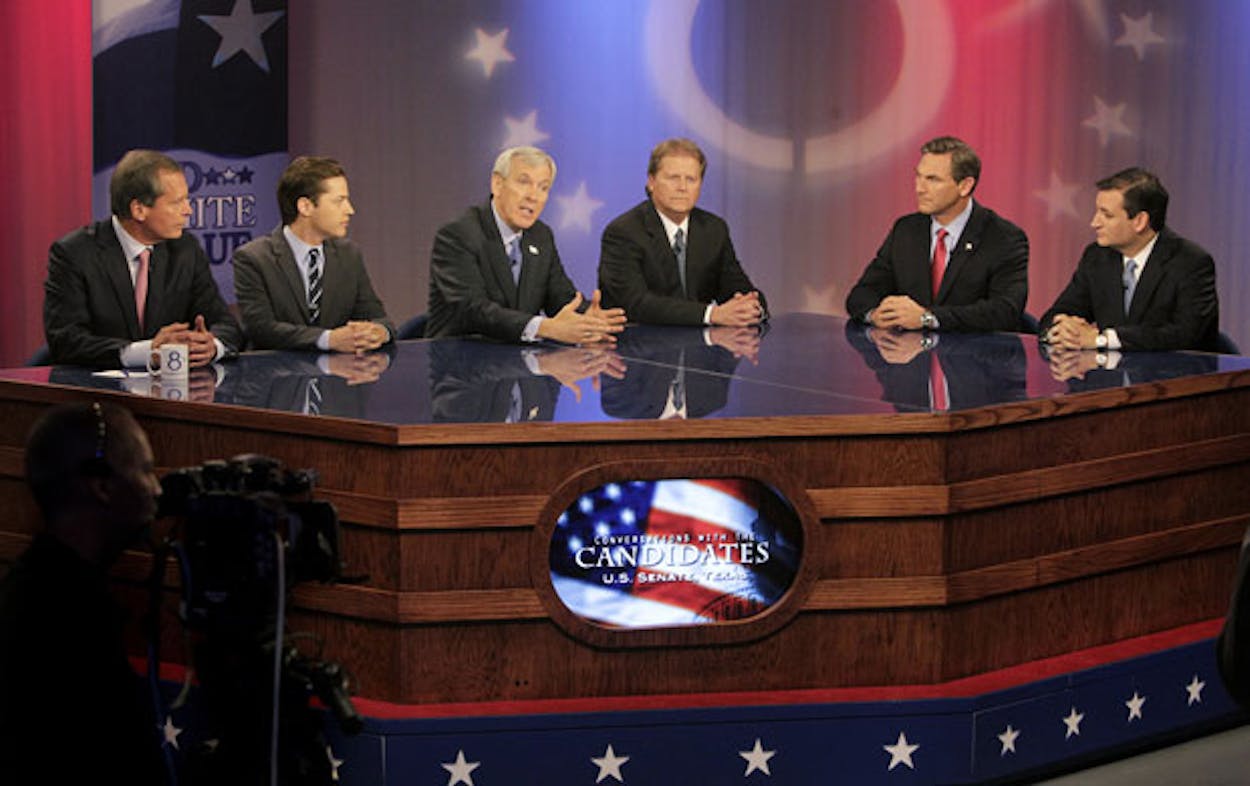And so, with the primary election finally upon us, Texas voters in the Senate race will answer the big question: can the older, more experienced front-runner clinch his party’s nomination with no runoff, or might the younger and less moderate challenger create a two-man race on July 31?
But enough about Paul Sadler and Sean Hubbard—it’s not like a Democrat is going to inhabit Kay Bailey Hutchison’s position in the U.S. Senate.
Because of the redistricting-delayed, post-holiday election, the Republican Senate primary–featuring Lieutenant Governor David Dewhurst as the start-to-finish front-runner and former solicitor general Ted Cruz as the most viable opponent–will end much like it began: quietly.
Originally, the Senate battle took a backset to the presidential sweepstakes, especially with Rick Perry in the race. Now, the lack of an actual presidential primary contest—as Chuck Lindell of the Austin American-Statesman noted, Perry isn’t even on the ballot as a lame-duck, even though Michele Bachmann, Newt Gingrich, Rick Santorum, and Jon Huntsman remain—has made the election uncompelling at the statewide level, leaving voter turnout as the big unanswered question.
As Robert T. Garrett and Gromer Jeffers Jr. of the Dallas Morning News reported:
While nearly 345,000 Republicans cast early ballots in the most-populous counties, a new record, experts agreed that was probably driven by many citizens’ desire to vote before the three-day weekend. Few analysts expect overall turnout to exceed that of recent elections.
That could be a bad sign for Dewhurst. The three-term lieutenant governor is expected to fare better with casual Republican voters than with party die-hards.
Whatever happens today, there’s little doubt that Dewhurst will finish first, and also no doubt that he sees Cruz as the biggest threat. Before the holiday weekend, Dewhurst unveiled one last attack ad alleging Cruz had strong ties to two Hispanic groups that favor amnesty for illegal immigrants.
Rice political science professor Mark P. Jones* told Jeffers the ad has “a flimsy factual basis” and suggested to the Austin American-Statesman‘s Kate Alexander that they were just over the line into race-baiting. “Were [Cruz] not Hispanic, this ad would make no sense,” Jones said.
Two recent polls had Dewhurst leading Cruz, respectively, by 41 percent to 31 percent and 46 percent to 29 percent, which actually suggests that former Dallas mayor Tom Leppert (polling between fifteen and seventeen percent) and the six other candidates may ultimately make the biggest difference.
If there is a runoff, the July date won’t improve turn-out. In fact, to slightly exaggerate the way the pundits (including TEXAS MONTHLY‘s Paul Burka and the Texas Tribune‘s Ross Ramsey) tell it, every registered voter in Texas will be gone, trying to escape the heat by skipping off to the beach or the Rocky Mountains.
But nationally, the race would be the big, pre-convention political story of the summer, the latest battle of a grass roots/Tea Party candidate (Cruz) versus an entrenched elected official (Dewhurst).
Wade Goodwyn of NPR’s Morning Edition summed up the contrast between the two candidates. First, he took in Cruz, who, along with Leppert, spoke to Republicans in Stephenville”
“Barack Obama is the most radical president this country has ever seen,” Cruz says. “And the unhappy truth is, as bad as Obama’s been, he didn’t invent spending. It was a bipartisan problem long before he got elected.”
Around the room, heads bob in agreement. The proposition that President Obama is a radical socialist is accepted fact with this group. But when Cruz says that Republicans are equally to blame for the debt problem, heads bob just as emphatically — the room believes that’s true, too. In two deft sentences, the former solicitor general has positioned himself outside both parties as the only real conservative with a chance to win.
And then, Dewhurst at “the Scholtz beer garden” (sic) in Austin.
It’s a completely different Republican crowd: Mercedes-Benzes parked outside, not F-150s. No iced tea or folding chairs; here, there’s a tight band, expansive bar and well-coifed, good-looking Texas women laughing as they drink.
There’s power gathered in this room, and the front-running lieutenant governor is pleased.
“Wow, what a great crowd. It’s amazing what beer will do. It really is,” he says, to cheers.
There’s no need for Dewhurst to dish red meat here — this crowd isn’t interested in getting the U.S. out of the United Nations; they’re building relationships and having a beer. Nevertheless, the candidate runs through his reasons for seeking the Senate like a tired runner approaching the finish line.
“I’m running for the United States Senate because on Day 1, I want to push for the repeal of Obamacare. I’m running for the United State Senate because I want to keep America strong, and I’m tired of the federal government not doing their job. We need to secure our borders,” he says.
Actually care about the Democratic race? Here’s Sadler and Hubbard talking with Brad Watson of WFAA’s Inside Texas politics on Sunday:
*(CORRECTION: This story originally misidentified Rice University politicial science professor Mark P. Jones. The TM Daily Post is sorry for the error.)
- More About:
- Politics & Policy
- Tom Leppert
- Ted Cruz
- David Dewhurst
- Craig James







